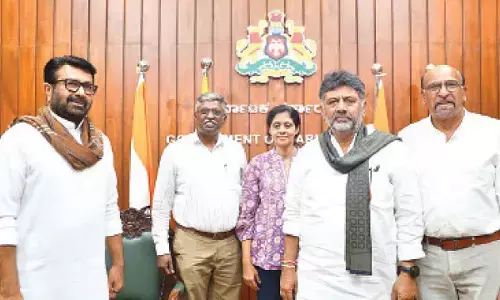Skill development critical

Skill development critical, Can India’s dream of becoming the greatest powerhouse of youth in the world, be realised? While the adage goes “if there’s a will, there’s a way”, it is a tough challenge for the NDA Government.
Can India’s dream of becoming the greatest powerhouse of youth in the world, be realised? While the adage goes “if there’s a will, there’s a way”, it is a tough challenge for the NDA Government. Though there have been advances in the economy, the mechanised system of production has resulted in not tackling the problem of unemployment and underemployment of the country. As such, the growth has not been able to provide jobs to the rapidly increasing work force.
Even the period between 2004-05 and 2009-10, when growth was above 9 per cent, there was virtually no increase in employment. Joblessness has emerged as a big threat to society, affecting mainly the economically weaker sections and low income groups.
The recently released figures of the National Sample Survey Organization (NSSO) revealed that over 11.3 crore persons or 113 million are seeking or are available for work. This huge number made up around 15 per cent of the working age population of about 7.48 crore in the 15 to 60 age group. These unemployed persons were distributed over nearly seven crore families, which is around 28 per cent of all households in the country.
Though no figures have been given by the NSSO, underemployment is also a serious problem, especially in the rural areas. Agriculture, in most cases, cannot provide employment for all 12 months and, as such, most families are underemployed for a considerable part of the year. The National Rural Employment Guarantee Scheme (NREGS) has, no doubt, been of some help to the rural population but due to corruption in the system and lack of proper monitoring, it is not known how effective it has been in generating employment.
It is only lately that Modi has been talking of skill development and announced some vital measures to impart skill training to the unemployed to enable them to make a living. The thinking is that skill development is important not only to reap the benefits of India’s demographic dividend but also to fuel inclusive growth. Recently the National Skill Development Corporation (NSDC), under a public-private partnership, has been tasked with imparting skills to 150 million people out of 500 million overall by 2022.
The areas of skill development include manufacturing linked to solar panels, waste management, auditing and assessment, research and improvement of new technology and public transit skills. Apart from these, manufacture of jewellery, sanitation materials, low-cost electronic gadgets and the like should also be taken up for skill development.
Only recently, the government declared it would spend Rs 500 crores on skill development of the urban poor under a scheme named ‘Deen Dayal Antyodaya Yojana (DAY).’ It would focus on imparting skills with expenditure of Rs 15,000 to Rs 18,000 on each and would help promote self-employment by setting up individual micro and group enterprises.
Meanwhile, the new ministry of skill development and entrepreneurship, which came into operations with the formation of the Government, would work for better coordination in evolving appropriate skill development framework and building of new skills along with removal of the disconnect between demand for supply of skilled manpower through vocational as well as technical training.
The overhauling of the Apprenticeship Act 1961 would help impart on-the-job training and help thousands and lakhs of youth get employment or start new ventures.
The ‘Make in India’ campaign, should be kept in mind while drawing up the list as 25 sectors have been identified where the country can surge ahead. Apart from this, vocational training has to be made part of the school curriculum, skill programmes to be taken up seriously by State governments and ensure these are subsidised. Last but not the least is greater clarity on skill programmes under labour and other ministries in various skilling initiatives that need to be adopted.
The challenge is to bring down the level of unemployment and underemployment. Only proper skill training and entrepreneurship development is the only alternative. Only sincerity and political will of the Centre and the States can make this successful. If, however, Modi can implement this, a new chapter would undoubtedly be opened in solving a crucial socio-economic problem of the country.
The country’s rural sector offers enormous possibilities and it is expected that there would be a national dialogue with the private sector to evolve and implement an action plan where the tasks of employment generation along with rural development, specially in the backward regions, could be accomplished simultaneously. Only then can the country achieve inclusive growth, benefitting the larger segment of society.








